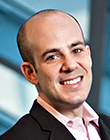How to Champion Diversity, Equity and Inclusion at WorkMay 15, 2023
By Scott SteinbergHow to Champion Diversity, Equity and Inclusion at Work
 Hailed as the world’s leading business strategist, award-winning expert witness, strategic consultant and professional speaker, Scott Steinberg is among today’s best-known trends experts and futurists, and the bestselling author of “Think Like a Futurist;” “Make Change Work for You: 10 Ways to Future-Proof Yourself, Fearlessly Innovate, and Succeed Despite Uncertainty;” and “Fast >> Forward: How to Turbo-Charge Business, Sales, and Career Growth.” The president and CEO of BIZDEV: The International Association for Business Development and Strategic Partnerships, his website is FuturistsSpeakers.com.
Hailed as the world’s leading business strategist, award-winning expert witness, strategic consultant and professional speaker, Scott Steinberg is among today’s best-known trends experts and futurists, and the bestselling author of “Think Like a Futurist;” “Make Change Work for You: 10 Ways to Future-Proof Yourself, Fearlessly Innovate, and Succeed Despite Uncertainty;” and “Fast >> Forward: How to Turbo-Charge Business, Sales, and Career Growth.” The president and CEO of BIZDEV: The International Association for Business Development and Strategic Partnerships, his website is FuturistsSpeakers.com.
Attention, meeting and event industry execs: Unsurprisingly in an age of greater equity, scrutiny and personal awareness, four in five workers now want to work for firms that make diversity, equity and inclusion a priority. What’s more, a whopping 90% are fully on-board with and committed to promoting the cause of DEI in the workplace. Keeping this in mind, it bears reminding that creating happier, more inclusive and equitable companies is often a systemic challenge though, with effecting positive change here requiring MICE industry leaders to rethink the fundamental way that businesses operate from three dimensions: Workplace, workforce and working model. That said, with 75% of workplace leaders now measuring success in terms of employee satisfaction, it’s clear that it’s a challenge we must rise to as meeting and event industry professionals as we work to create more equitable and diverse workspaces.
Championing DEI
An important point to also keep in mind here, however: As we note in new book FUN AT WORK, the idea of “diversity” doesn’t always describe something immediately visible to the naked eye, e.g. in the form of age, race or gender. To be successful leaders in tomorrow’s working world, we must also actively work to promote diversity of thought, opinion and perspective in our businesses if we hope to be successful. As MICE industry leaders are often all-too-aware, when groupthink takes hold, you can’t give your best efforts in terms of creativity or innovation, or consistently ensure that your people are bringing their best ideas are to the table. To ensure that you’re championing the cause of DEI in your office, this means having to ensure that everyone on your team has the support and backing they need to routinely speak up, take action and give their best efforts under any working conditions Likewise, you’ve also got to ensure that all team members are engaged, enjoy a positive experience, and that you’re providing platforms, processes and safe, welcoming environments that invite them to speak up and make their voices heard at all turns.
Of course, that’s easier said than done in a time of hybrid and remote working models, which can often add further hiccups when managers are working to creating a productive working environment. For example, finding ways to make sure that both remote and in-office workers feel equally valued and appreciated, that consistent HR policies and procedures are applied, and that you’re observing proper safety protocols on-site are no small tasks. Likewise, finding ways to address proximity bias (which occurs when individuals tend to assign more opportunities, import and projects to the people physically closest to them vs. those out of sight) is also paramount. As a meetings industry executive, that means having to promote constant and up-front communications amongst your team, and utilize a host of soft skills and talents as a business leader such as active listening, emotional intelligence and empathy when managing people.
Nurturing the Next Generation
Nurturing tomorrow’s leaders, especially those who hail from younger generations, such as Millennials and Gen Zers, also requires having to actively think about how their needs are changing. For example, these generations may prioritize access to more mentorship and learning opportunities, or more flexible working setups and models, as compared to older staffers. From considering how you design individualized workplace perks to providing customized benefits and learning allowances, meeting younger hires’ needs often requires a fundamental rethinking of traditional HR models. Moreover, it also means having to be more empathetic and understanding, and striving to better align policies, procedures and perks with employees’ fast-changing priorities.
As a friendly reminder, today’s workforce is more diverse, well-educated and multi-generational than ever – and wields more power than ever in an increasingly tough hiring market. If you want to design a workplace that appeals to meeting and event pros of all stripes, it means that you’ll have to not only be more flexible, adaptable and open-minded as an executive leader. It also means that you’ll additionally have to actively work to encourage inclusivity, creativity and employee engagement at every turn. Noting this, working to champion a more diverse, equitable and inclusive culture will only be part and parcel with successfully adapting to tomorrow’s business world. Moreover, it’s a task that no one MICE industry pro, however brilliant or talented, can succeed in alone. Noting this, once again, the one way forward is together – time and again you’ll find in coming years that it’s imperative to consistently and confidently bring others with different voices, perspectives and backgrounds to the table. C&IT








